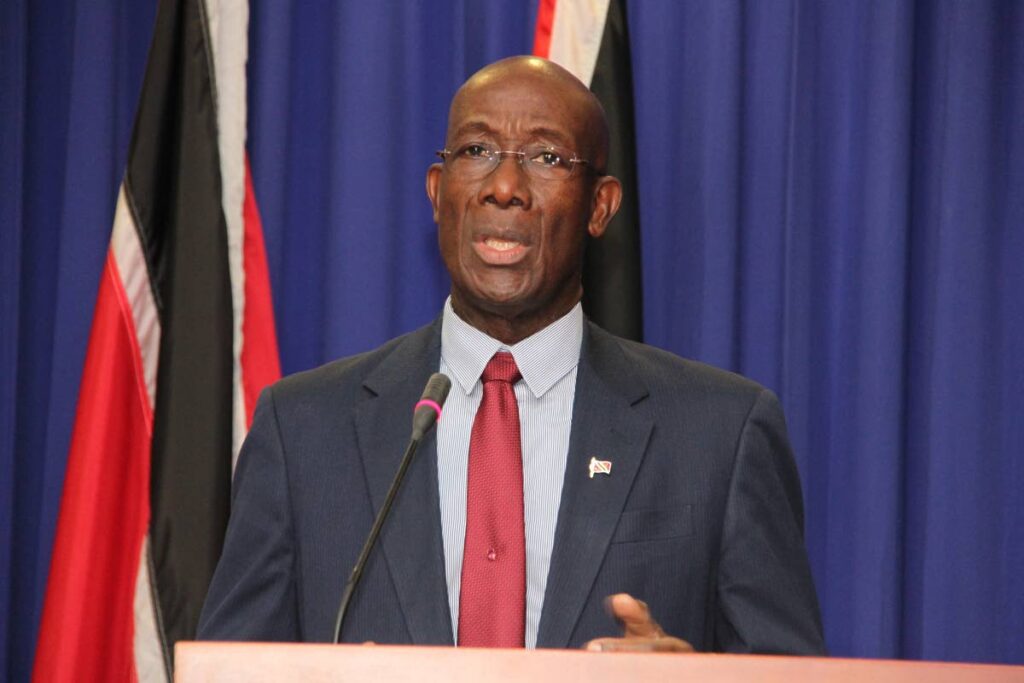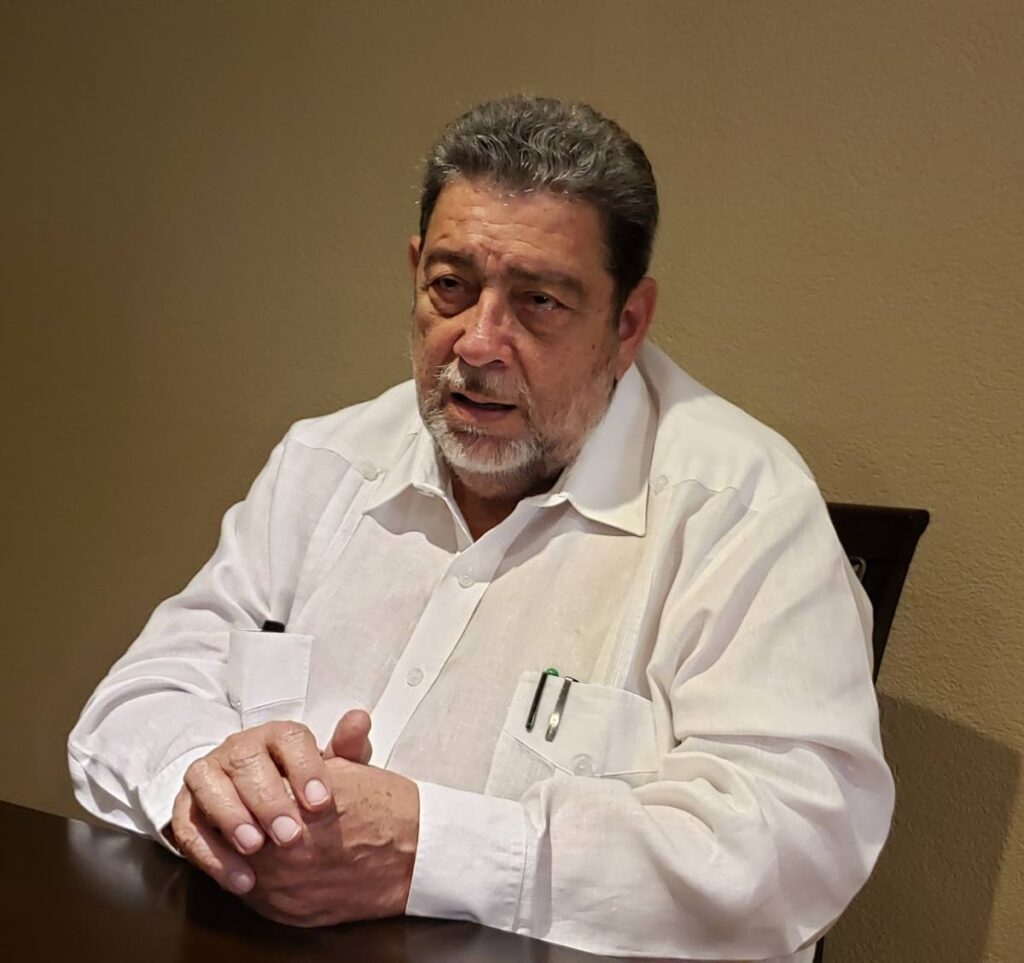[UPDATED] Covax bills St Vincent for vaccines donated to TT: You owe US$70,000

"Bureaucracy gone mad" is how the Prime Minister is describing the demand by the covid19 Vaccines Global Access (Covax) facility that St Vincent and the Grenadines should pay US$70,000 for the 5,000 vaccine doses it donated to TT in May.
A CANA report said St Vincent Prime Minister Dr Ralph Gonsalves, speaking on Vincentian radio station NBC Radio on Wednesday, said Covax told his government it should have returned the vaccines that were not being used.
“Covax said to us what we gave to Trinidad, we should not have done so, we should have given them back, and (Covax) would give whoever they want. I think they had somewhere else they wanted to give them – not in the Caribbean.
"We gave them to Trinidad, so we will have to pay for those. It’s about US$70,000. I believe the payment has been made already, because if we are getting now through the US, I don’t want to have any indebtedness to Covax.”
Gonsalves said when Dr Rowley heard about the development, the government offered to pay for the vaccines, but Gonsalves refused.
“I said, ‘No, no, no. no. no. We gave you.' We are a people of solidarity. That’s how we function. Social solidarity, regionally, globally and nationally. Love thy neighbour as you love yourself.
"Trinidad has been very generous to us in many, many ways. I can’t give you that and ask you to pay for it. Absolutely not. That ain’t how we stop. We nah stop so.”
Speaking at a media conference on Friday, Rowley initially said he had not heard that report. He went on to say he was not surprised by the demand. He said it was raised at the time the vaccines were offered.
“That is bureaucracy gone mad. The option of the government of SVG (St Vincent and the Grenadines) was to have those vaccines expire and be dumped. We were in a position to make use of them, and it was against that background that the government of St Vincent took the decision that they prefer to have them utilised them in TT than to have them expire and be dumped.
“The bureaucrats at PAHO are saying, 'It was our supply to you, and if you let anybody else to it, you’re going to have to pay for it.'
"Of course, they are blind to the fact that the vaccines in a pandemic were made to be utilised by people who wanted to use them. So I’m not surprised. Bureaucrats do things like that.”
Foreign and Caricom Affairs Minister Dr Amery Browne, in response to a WhatsApp message from Newsday, expressed his appreciation of the strong regional solidarity and camaraderie he said joined the leadership of the region.
“This focus on the common regional good has resulted in lives saved during an intense period of sharing of vaccines amongst our respective territories. This solidarity has seen the Caribbean community through many natural disasters and it will be an important component of how history records our collective fight against the covid19 pandemic.”
The vaccines from SVG were available to be given away as there was very low uptake on the island owing to high vaccine hesitancy, despite numerous incentives being offered.

SVG was one of the lower-income countries in the Americas which received vaccines from Covax free of charge, as well as Dominica, Grenada, Guyana, Haiti, and St Lucia, while TT paid for the vaccines it acquired through the facility, as did Antigua and Barbuda, The Bahamas, Barbados, Belize, Dominica, the Dominican Republic, Grenada, Guyana, Haiti, Jamaica, St Kitts and Nevis St Lucia, St Vincent, and Suriname.
The vaccines were acquired through Covax through the Pan-American Health Organisation’s Revolving Fund. Covax was to provide vaccines for at least 20 per cent of the population of each participating country during 2021.
When asked via WhatsApp whether TT had had to pay for the vaccines it donated to its Caribbean neighbours, Health Minister Terrence Deyalsingh told Newsday to forward the question to Browne, who did not respond.
Newsday attempted to contact PAHO to determine if this condition of repayment if the vaccines were given away was known to the countries who were participating in Covax, and whether it applied only to countries who received vaccines for free as opposed to those who paid for their vaccines. There was no response up to press time.
Jamaica is one of the countries in the Caribbean that has been known to dump vaccines. It has received a total of 1,005,240 vaccines from Covax, split between AstraZeneca and Pfizer beginning in March 21. On November 1, it dumped 185,000 AstraZeneca vaccines that expired on October 31. On November 1, the government had to dump 55,000 AstraZeneca vaccines donated by the UK.
Haiti has received 600,100 doses of Moderna, beginning in July. Up to November 19, 118,222 people had received a first dose, with 66,888 people fully vaccinated.
The Covax facility was formed by the GAVI Global Vaccine Alliance as part of the Access to covid19 Tools (ACT) Accelerator, a global collaboration of global health organisations in an unprecedented effort to accelerate the development, production, and equitable access to new covid19 technologies.
Countries accessing Covax were either self-financing or non-self-financing. Self-financing countries had two options to get vaccines, a committed purchase where they would pay a lower upfront payment of US$1.60 per dose, or 15 per cent of the total cost per dose, or an optional purchase arrangement where they would make a down payment of US$3.10 per dose and a risk-sharing guarantee of US$0.40 per dose.
The 92 middle- and lower-income countries that couldn’t fully afford to pay for covid19 vaccines were financed by official development assistance from sovereign nations (ODA), as well as contributions from the private sector and philanthropy.
This story was originally published with the title
"PM: Covax demand to St Vincent 'bureaucracy gone mad'" and has been adjusted to include additional details. See original post below.
"Bureaucracy gone mad" is how the Prime Minister is describing the demand by the covid19 Vaccines Global Access (Covax) facility that St Vincent and the Grenadines should pay US$70,000 for the 5,000 vaccine doses it donated to TT in May.
A CANA report said St Vincent Prime Minister Dr Ralph Gonsalves, speaking on Vincentian radio station NBC Radio on Wednesday, said Covax told his government it should have returned the vaccines that were not being used.
“Covax said to us what we gave to Trinidad, we should not have done so, we should have given them back, and (Covax) would give whoever they want. I think they had somewhere else they wanted to give them – not in the Caribbean.
"We gave them to Trinidad, so we will have to pay for those. It’s about US$70,000. I believe the payment has been made already, because if we are getting now through the US, I don’t want to have any indebtedness to Covax.”
Gonsalves said when Dr Rowley heard about the development, the government offered to pay for the vaccines, but Gonsalves refused.
“I said, ‘No, no, no. no. no. We gave you.' We are a people of solidarity. That’s how we function. Social solidarity, regionally, globally and nationally. Love thy neighbour as you love yourself.
"Trinidad has been very generous to us in many, many ways. I can’t give you that and ask you to pay for it. Absolutely not. That ain’t how we stop. We nah stop so.”
Speaking at a media conference on Friday, Rowley said he was not surprised by the demand. He said it was raised at the time the vaccines were offered.
“That is bureaucracy gone mad. The option of the government of SVG was to have those vaccines expire and be dumped. We were in a position to make use of them, and it was against that background that the government of St Vincent took the decision that they prefer to have them utilised them in TT than to have them expire and be dumped.
“The bureaucrats at PAHO are saying, 'It was our supply to you, and if you let anybody else to it, you’re going to have to pay for it.'
"Of course, they are blind to the fact that the vaccines in a pandemic were made to be utilised by people who wanted to use them. So I’m not surprised. Bureaucrats do things like that.”
Foreign and Caricom Affairs Minister Dr Amery Browne, in response to a WhatsApp message from Newsday, expressed his appreciation ofthe strong regional solidarity and camaraderie he said joined the leadership of the region.
“This focus on the common regional good has resulted in lives saved during an intense period of sharing of vaccines amongst our respective territories. This solidarity has seen the Caribbean community through many natural disasters and it will be an important component of how history records our collective fight against the covid19 pandemic.”
SVG was one of the lower-income countries which received vaccines from Covax free of charge, while TT paid for the vaccines it acquired through the facility.
When asked via WhatsApp whether TT had had to pay for the vaccines it donated to its Caribbean neighbours, Health Minister Terrence Deyalsingh told Newsday to forward the question to Browne, who did not respond.


Comments
"[UPDATED] Covax bills St Vincent for vaccines donated to TT: You owe US$70,000"